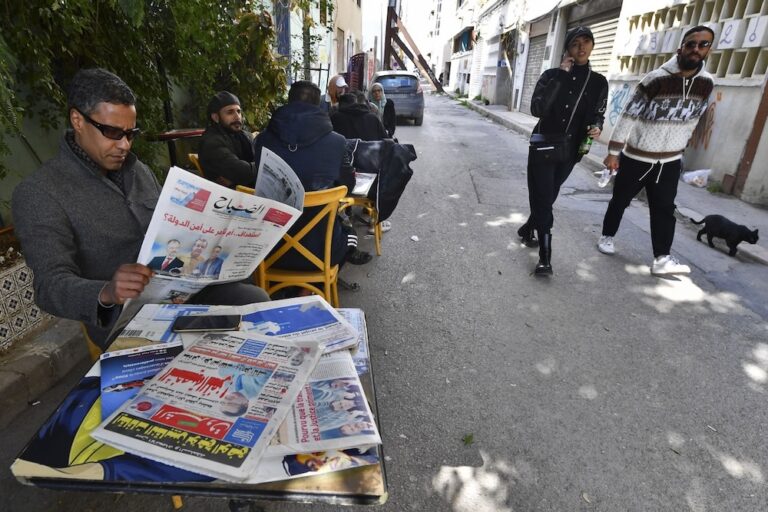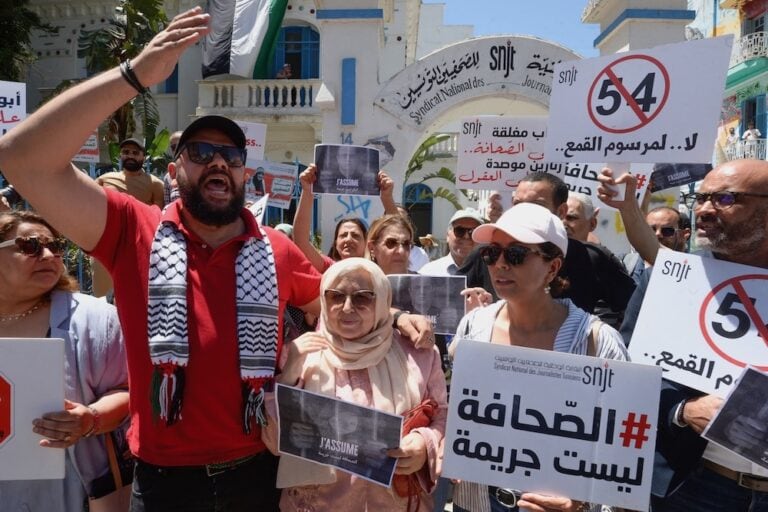Tension had been fuelled by recent talk of “privatization of the public media” by Ennahda Movement leader Rached Ghannouchi and Ennahda political bureau member Ameur Laarayedh.
(RSF/IFEX) – 26 April 2012 – Reporters Without Borders is extremely concerned about the violent clashes that took place outside the Tunis headquarters of the state-owned Télévision Nationale network on 23 and 24 April between journalists working for the network and those who had been staging a sit-in outside since 2 March to press for a purge of the state media.
Tension had been fuelled by recent talk of “privatization of the public media” by Ennahda Movement leader Rached Ghannouchi and Ennahda political bureau member Ameur Laarayedh, who is a member of the Constituent Assembly. The moderate Islamist Ennahda has more seats than any other party in the assembly and its secretary-general is the current prime minister.
During an interview for the Qatari daily Al-Sharq and the Omani daily Oman on 18 April, for example, Ghannouchi referred to the possibility of “taking radical measures in the news media domain including, possibly, privatizing the public media.”
“Coming amid tension between the government and the Télévision Nationale staff, these statements just pour oil on the flames and exacerbate the mistrust that is preventing the media and politicians from moving forward on the major decisions that must be taken during the transition,” said Reporters Without Borders, which opposes privatization of the public media.
According to the information available to Reporters Without Borders, three journalists were physically attacked from 20 to 24 April, one of them twice:
Fedia Ben Hemda, a producer, was insulted and manhandled after she tried to take a photo of the plaque outside Télévision Nationale on which the protesters had written the words “TV7 for sale.”
Reporter Walid Hamaroui was attacked on 23 April as he and others repaired the plaque outside the station. The next day he was stabbed with a knife in the palm of his hand.
Kais Ben Mefteh, a member of the Télévision Nationale producers union, was attacked on 24 April, sustaining a hand injury for which he was treated in hospital.
The National Body for the Reform of Information and Communication (INRIC) issued a statement on 23 April pointing out that democratic countries do not usually privatize public media and calling for tolerance towards the media during the transition to democracy.
At the same time, a coalition of civil society organizations including the Tunisian Human Rights League, the Rally for Alternative International Development (RAID), Amnesty International and the National Union of Tunisian Journalists (SNJT) issued a joint statement condemning the violence and harassment of the media.
The end of the sit-in yesterday was followed by a pro-Télévision Nationale demonstration outside the municipal theatre on the capital’s Bourguiba Avenue.
Reporters Without Borders also condemns Habib Belaid’s sudden removal as interim head of the national public radio network on 24 April. The heads of four state-owned radio stations – Radio Le Kef, Radio Jeunes, Radio Culture and Radio Tunis Chaîne Internationale – resigned in protest.
“It is shocking that Habib Belaid was only notified of his dismissal four days after it was reported in the Tunisian Republic’s Official Gazette,” Reporters Without Borders said.
The organization also urges the government, which plans to hold a national consultation on media legislation, not to lose track of the priorities.
“An independent broadcast media regulatory body must be created before people are appointed to run the state-owned media,” said Reporters Without Borders, which was very critical of the sudden appointment of new state media bosses on 9 January without prior consultation and without would-be candidates being invited to apply.


